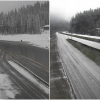With just a couple of months to go until the arrival of Jean Chrétien in Kelowna, NowMedia has spoken with an expert on Canadian politics about the Little Guy from Shawinigan’s place in history.
Maxime Heroux-Legault, an assistant professor of political science at Concordia University (who will be joining the faculty at UBCO within the next 30 days), gave a brief summary of some of the highlights of Chrétien’s reign.
He served as prime minister – Canada’s 20th – from 1993 to 2003.
And while he might be best remembered for more high-profile moments, Heroux-Legault said that as he sees it – being a specialist in the study of elections – one of his most important achievements was to do with party finances.

“He changed the rules for party fundraising,” Heroux-Legault explained.
“That made it illegal for corporations or unions to donate to political parties, and set the limit for individuals to $5,000. It made Canadian parties less dependent on corporations.”
The reforms were made in 2003, right at the end of Chrétien’s time in office.
Stephen Harper – who will be joining Chrétien in Kelowna in the fall for the Level Up leadership conference – went even further, capping donations at $1,000.

“I know it’s very technical in a way but it has had a huge impact,” Heroux-Legault said.
“It meshes well with his background as someone from a working class family.”
Another highlight of Chrétien’s time as prime minister was his ratification of the Kyoto Protocol on greenhouse gas emissions in 1997.
“It put Canada on track in terms of contributing to tackling climate change,” Heroux-Legault explained.

The recently implemented carbon tax is a “continuation” of that gesture, he added.
Chrétien also made difficult decisions that came at a cost, but which ultimately helped to define Canada in modern times.
“His refusal to participate in the war in Iraq potentially put strain on the relationship with the US, but it also marked Canada out as more moderate,” Heroux-Legault said.
“That was very important.”

But since the former prime minister is coming to Kelowna to discuss the art of leadership, what was his style?
“He was a real character,” Heroux-Legault explained.
“He worked very well with [Pierre] Trudeau. Trudeau came up with a certain vision for the Charter [of Rights and Freedoms], but Chrétien was more willing to negotiate.”
While Chrétien perhaps displayed more pragmatism than Trudeau, he also ruled at a time when prime ministers had increasing power.
“Under Chrétien there was a phenomenon in which there was a centralization of politics,” Heroux-Legault said.

“Power was centralized around the prime minister and the Prime Minister’s Office. What I have observed is that cabinet might have felt they were a bit sidelined – decisions were being taken by the prime minister.”
This increased power is one of the reasons that Chrétien was able to enjoy such a successful prime ministership.
He is traditionally ranked in the top 10 of leaders throughout Canadian history, with a survey of scholars putting him at 7th in 2016.
But all leaders make mistakes. What was Chrétien’s?
“The handling of the 1995 [Quebec] referendum has been very controversial,” Heroux-Legault explained.
“Both federalists and nationalists were unhappy – some federalists wanted more compromise, the nationalists felt he was too hard.
“What followed is thought to have exacerbated tensions. People thought that the federalists should have won with a higher majority.”
















